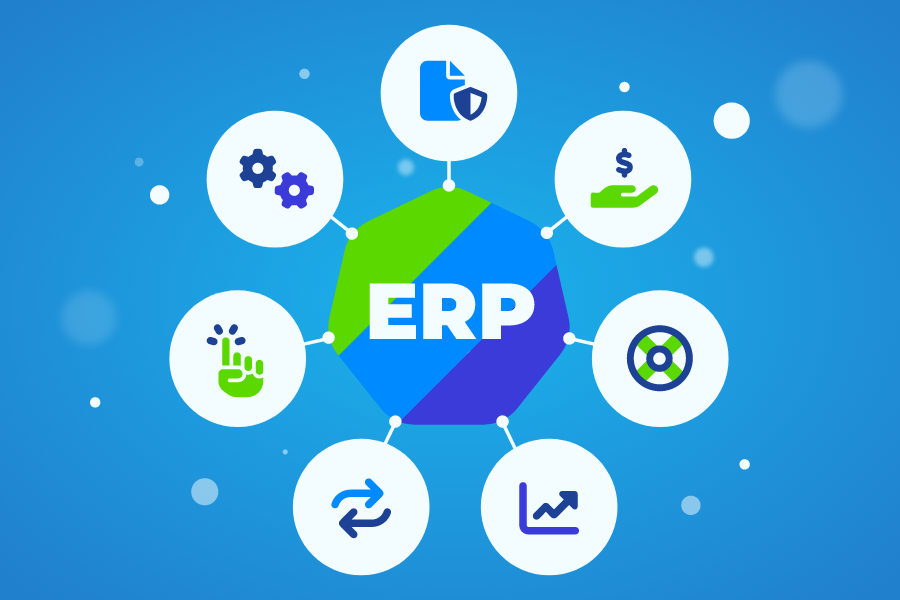
Selecting the right ERP package can be an overwhelming task. Many companies or business owners think that any ERP will work for their organization, and they are even willing to change the business model to conform to the functionality of the software. The decision to choose an ERP system should not be taken lightly.
Here are 7 things which you should keep in mind while selecting an ERP system for your organization.
Data security
Most modern ERP systems are cloud-based systems. Many organizations have concerns about data security while considering a cloud-based ERP System. It’s important to understand that cloud ERP systems are extremely secure, and data may be far more secure than it would be in-house with many added advantages.
While selecting an ERP system, the organizations must ask questions like: how is the data is stored? What are the protocols in case of there is a data breach? Who would have access to the data and why? etc. Data security should never be taken lightly, and organizations should never shy away from asking vendors as many questions as possible about data security.
Read on: How do employees benefit from a true cloud ERP?
Cost of ownership
There are different costs associated with the ERP Systems. These include:
Implementation cost
This is the initial price an organization pays for implementation of the ERP.
Customization cost
If the off-the-shelf ERP system does not suit all of the organization’s business requirements, they may prefer to customize certain processes and flows to suit their workflow.
Training
ERP Systems are complex in nature and organizations must provide training to its staff for using the new system. While a certain number of training hours are generally included in the implementation cost, it may not be sufficient to cover the training for everyone. Vendors may charge for additional training hours, which is referred as the training cost.
Upgrade cost
There are various reasons for upgrading an ERP system like changing market conditions, new regulations, etc. The vendor might charge a fee for upgrading the ERP system to meet the new requirements. Any cost associated with the new requirements may be categorized as the upgrade cost.
Support and maintenance cost
The ERP system either needs to be maintained in-house if the vendor has an IT team, or the organization must outsource the maintenance to the vendor for a fee. In both the cases, there is a cost. Maintenance may include changing the configuration, granting, modifying or revoking access rights, etc.
While evaluating an ERP system for your organization, you must ask the vendor about all the costs associated with it - not just the implementation cost.
Read on: Three unique features your ERP solution should have.
Customer support
Customer support is one of the most important aspects of any ERP system. Many low-cost ERP systems might have almost non-existent customer support. While selecting an ERP System, organizations should find out from the vendor about their customer support policy, how long it takes to resolve the tickets of various priorities, and all other related questions.
Productivity improvement
One of the main reasons why organizations implement an ERP system is productivity improvement. Productivity improvement include improved efficiency, better compliances, higher employee engagement, better and faster decision making, etc. Organizations may come up with their own strategy to measure the improvement in productivity and, based on the outcome of that measurement, may fine tune the processes. The ERP system should provide the flexibility to adapt to such changes.
Seamless transition
While transition from one ERP system to another one may be less time consuming, moving from a traditional system to an ERP system for the first time may be a daunting task which can take from a week to a few months. The transition process should be jointly owned by the organization and the ERP vendor. Sometimes, the transition may even involve setting up new database or altering some tables or some fields in tables.
Ease of use
ERP systems are complex in functionality. But that doesn’t mean they have to be complex to use. An easy to use ERP system can:
- Require less time for employees to adapt
- Reduce the training time and cost
- Less human errors
- Be better accepted by employees
The organization must request a demo or evaluation version of the ERP system and ensure that the ERP system has a familiar look and feel, that it provides role-based functionality and that most of the frequently used features can be accessed with fewer clicks.
Customized for your business
An off-the-shelf ERP system in which some of the modules can be customized to suit your business needs can give you the best value for your money. While many large ERP developers may not give you this option, or may be very expensive, small and mid-size vendors are the best option for this kind of customization. Organizations must discuss their specific requirements for customization with the ERP vendors.
Read on: Get your ERP tailored the way you want.
ERP solutions are usually complex and expensive. That’s why its crucial that organizations do extensive research to find the best solution for them without any tradeoffs.
You can start by checking out Vault ERP – with a variety of modules to choose from, options for a multi-company set-up, and the possibility of extensive customization, Vault ERP might be the right ERP system for your business. Book a demo to find out.
